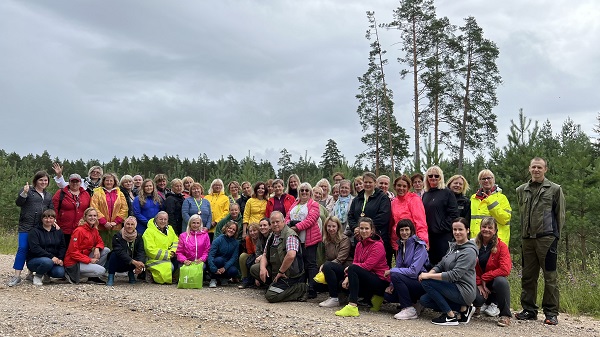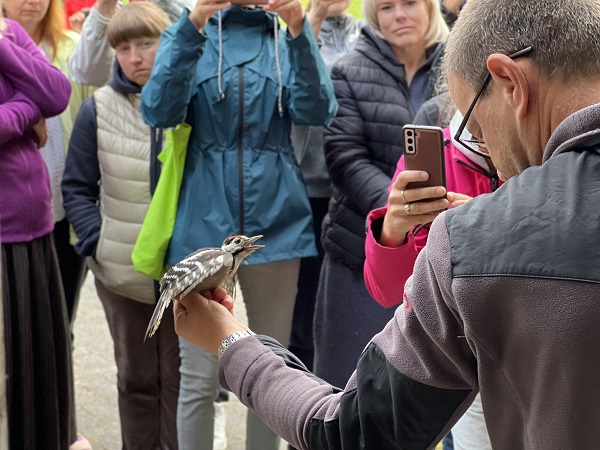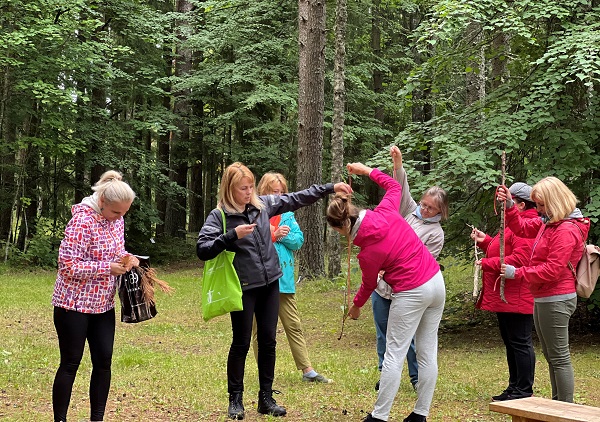Teachers Learn the Experience of Scandinavian Forest Education
At the end of July, almost 50 teachers who last year participated in the environmental education programmes “Mother Nature Master Class” and “Pigman’s Detectives” implemented by JSC “Latvia's State Forests” (LVM) gathered in a creative recreation camp for continuing education courses to supplement their knowledge of forest education for holding classes outside the school premises.
Over the course of several days, the teachers discussed important issues and collected ideas for the next school year; they also had an opportunity to take part in informative and practical classes.
Discussions and new knowledge
Together with ornithologists of the Latvian Bird Foundation, the teachers could learn more about the diversity of Latvian bird species and participate in a demonstration of bird ringing at dawn. Specialists of Latvia’s State Forests Kalsnava Arboretum shared their valuable experience in creating environmental education events and informative materials for different age groups, as well as introduced the teachers to the rare and exotic tree species growing in the arboretum.
To learn more about the work of foresters, the teachers together with Jurijs Ješko, LVM Ziemeļlatgale Region Senior Forester, and Vilnis Otvars, Madona District Senior Forester, headed to the forest together, to get to know both the specifics of the work and to assess the importance of forest management in practice. The participants recognized the foresters' fight with the European spruce bark beetle (Ips typographus) as one of the biggest challenges, since the spread of this species has increased rapidly in recent years due to climate change. In his turn, Kristaps Klauss, Executive Director of the Latvian Timber Industry Federation, introduced the audience to the importance of the forest industry in the national economy of Latvia, encouraging the teachers to discuss various forest issues, including the growing importance of forestry in ensuring energy independence, as well as balancing environmental and social needs in Latvian forest areas.
The teachers also visited LVM Podiņi Nursery, where they got acquainted with the company's seedling production process from a seed to a seedling, which is then additionally processed to protect it from damage caused by pests. To understand the future path of high-quality planting material, Kristaps Ceplis, Head of the association “Zaļās mājas”, led a practical lesson with demonstrations, explaining the role of wood as an environmentally friendly building material in the future.
International experience also in Latvian classrooms
The 36-hour continuing education courses for teachers organized by LVM have been held for the 16th time this year. This time, Swedish textbook author Lotta Carlegård was among the guest lecturers she introduced the Latvian teachers to the experience of Swedish nature schools in forest environment education. Workshops led by the author were also held for the promotion of students' competencies, and during these workshops the teachers acquired a number of different methods for conducting the learning process interactively in nature.
Laurenči Primary School teacher Anna Greidāne talks about the guest lecturer's classes: “The lecturer is a very knowledgeable professional in her field, who definitely knows how to catch the interest of her audience. The outdoor lessons were very good. I will certainly use most of Lotta's methods in my school as well – I have already thought about how to use some of the ideas in my classes.”
Ilona Romanovska, teacher at Rēzekne elementary school No. 6: “The ideas can be used not only in biology, but also in language and classroom lessons – they are adaptable to different subjects and age groups.”
To learn more about the work of foresters, the teachers together with Jurijs Ješko, LVM Ziemeļlatgale Region Senior Forester, and Vilnis Otvars, Madona District Senior Forester, headed to the forest together, to get to know both the specifics of the work and to assess the importance of forest management in practice. The participants recognized the foresters' fight with the European spruce bark beetle (Ips typographus) as one of the biggest challenges, since the spread of this species has increased rapidly in recent years due to climate change. In his turn, Kristaps Klauss, Executive Director of the Latvian Timber Industry Federation, introduced the audience to the importance of the forest industry in the national economy of Latvia, encouraging the teachers to discuss various forest issues, including the growing importance of forestry in ensuring energy independence, as well as balancing environmental and social needs in Latvian forest areas.
The teachers also visited LVM Podiņi Nursery, where they got acquainted with the company's seedling production process from a seed to a seedling, which is then additionally processed to protect it from damage caused by pests. To understand the future path of high-quality planting material, Kristaps Ceplis, Head of the association “Zaļās mājas”, led a practical lesson with demonstrations, explaining the role of wood as an environmentally friendly building material in the future.
International experience also in Latvian classrooms
The 36-hour continuing education courses for teachers organized by LVM have been held for the 16th time this year. This time, Swedish textbook author Lotta Carlegård was among the guest lecturers she introduced the Latvian teachers to the experience of Swedish nature schools in forest environment education. Workshops led by the author were also held for the promotion of students' competencies, and during these workshops the teachers acquired a number of different methods for conducting the learning process interactively in nature.
Laurenči Primary School teacher Anna Greidāne talks about the guest lecturer's classes: “The lecturer is a very knowledgeable professional in her field, who definitely knows how to catch the interest of her audience. The outdoor lessons were very good. I will certainly use most of Lotta's methods in my school as well – I have already thought about how to use some of the ideas in my classes.”
Ilona Romanovska, teacher at Rēzekne elementary school No. 6: “The ideas can be used not only in biology, but also in language and classroom lessons – they are adaptable to different subjects and age groups.”





